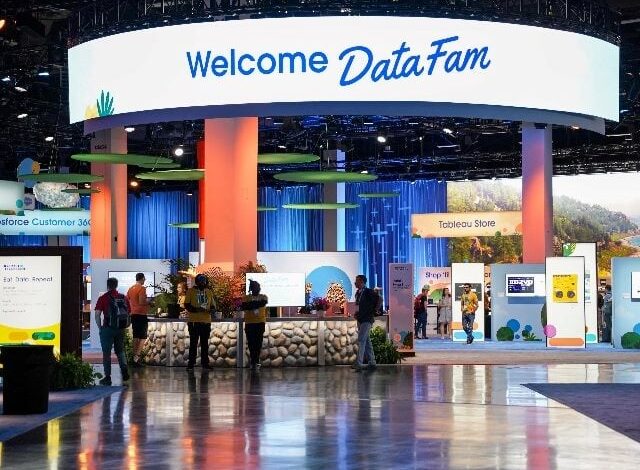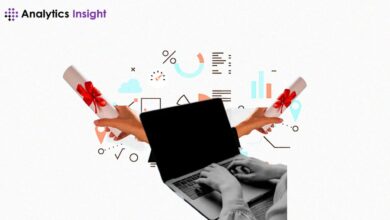Salesforce Tableau Unveils New Data Horizons at Conference

The Gist
- Integrations and AI-driven analytics. Tableau’s enhancements with Salesforce and the introduction of Einstein Copilot represent a significant leap toward more AI-driven data analytics, offering real-time, actionable insights to enhance decision-making processes.
- Real-time customer data access. The integration with Salesforce’s Data Cloud and the capabilities of Einstein Copilot allow marketing professionals to access and analyze customer data in real time.
- Strategic partnerships and innovation. Despite setbacks like the Informatica acquisition falling through, Tableau continues to push the boundaries in data analytics with new partnerships and innovations.
SAN DIEGO — This year’s Tableau Conference at the San Diego Convention Center takes place at a pivotal moment for data analytics and business intelligence. Salesforce’s Tableau makes a bold claim that “data is the event of the year.”
Against the backdrop of speculation of a potential acquisition of Informatica — a deal that doesn’t seem likely after all — today’s revelations hold the promise of reshaping strategies and redefining the overall data intelligence landscape. And I was honestly left feeling that leadership did not view the inability to come to terms with Informatica as a setback for their business plans.
One thing is certain: the impact of Salesforce Tableau‘s announcements will have relevance beyond a pure technical audience responsible for delivering business intelligence reports and analytics. Chief marketing officers without question seek to enhance marketing effectiveness and customer experience by getting faster customer insights.
In this article, I will delve into the highlights of this year’s announcements and unpack the transformative potential for marketing and sales leaders and the CIOs and chief data analytics officers (CDAOs) that support them.
Tableau CEO’s Vision
Ryan Aytay, Tableau CEO, emphasized in yesterday’s press conference the pivotal role of data and data visualization to today’s business leaders. For the CMSWire audience, the promise of increasing and richer integrations with Salesforce is an opportunity, offering enhanced capabilities and deeper insights.
Integration and Innovation
Aytay also outlined the evolution of data and analytics, highlighting waves of transition from traditional full-service to self-service and personalized consumption, signaling a shift toward more accessible and actionable insights.
Central to the discussion is the unveiling of Einstein Copilot and its seamless integration with Salesforce’s Data Cloud. Einstein Copilot will allow users to interface with natural language, but it will also provide guardrails and tell users when they can or can’t do with the output.
Tableau’s mission is to shift the paradigm from requesting data to discovering insights, empowering analysts to craft enterprise-grade data structures and semantics, fostering reusability in their work. With the introduction of Einstein Copilot for Tableau, users are guided through data preparation steps. This streamlines analysis workflows. Through Einstein Copilot for Tableau, data descriptions are automatically generated, enhancing discoverability and exploration of catalogs. For instance, hospitality professionals can effortlessly access detailed data descriptions tailored to their field, facilitating collaboration and analysis in Tableau.
Related Article: Salesforce Powers Ahead With Tableau Acquisition
Embracing Data-Driven Culture
Aytay underscores its importance for organizations wanting to embrace a data-driven culture, empowering every worker with the tools and knowledge to leverage data effectively. With the advent of the generative AI revolution, the urgency is palpable yet challenges persist on the path to data enlightenment. It’s what Gartner calls making data “AI ready.”
For this reason, it is not surprising that only 30% of workers say they use data to make business decisions today. According to a 2024 report by Forrester Research, “59% of data and analytics decision makers whose organization is using AI technologies report significant cost savings from using AI in operations, and 47% say they have AI-based data products that are generating revenue.”
The issues that get in the way today, says Aytay, include data fragmentation, user trust and the continued preference for gut-feel decision-making. Sometimes insights are ignored. Reactionary planning and analysis still exist as Russell Ackoff shared in “Creating the Corporate Future.”
Enhancing Decision-Making with Advanced Data Analytics
Aytay advocated a future where data jobs are augmented not eliminated. This is like Dave DeCremer’s coming book entitled, “The AI Savvy Leader.” The goal, Aytay believes, is to make insights more accessible and actionable for all stakeholders. The vision, therefore, for Tableau is to get to real-time, cloud-scale data analytics coupled with semantic understanding to deliver trusted and agile insights that drive informed decision-making.
At the heart of this transformation lies the need for organizations to create reusable, composable data frameworks that facilitate seamless data summary, data preparation and semantic modeling. Interestingly, Aytay emphasizes the importance of risk mitigation through controlled data management, ensuring that insights are derived from clean, deduplicated data sources. What is the ultimate goal? Turning insights into action by connecting knowledge workers across the organization and enabling data-driven decision-making at every level.
Related Article: 10 Insights for Chief Data Officers From Gartner’s Data & Analytics Summit
The Generative AI Business Plan
Tableau CPO Southard Jones believes generative AI can revolutionize self-service analytics by democratizing data access and analysis. By making analytics more approachable and automated, generative AI empowers analysts and data consumers, such as CMOs, to harness insights for more informed decision-making. With only 30% of workers currently utilizing data for business decisions, the goal is to broaden the reach of analytics tools, driving increased business usage; something I remember was a problem from my stent at a data catalog vendor.
Notably, organizations that leverage AI technologies are already experiencing significant cost savings and revenue generation from AI-based data products, highlighting the transformative potential of generative AI in driving business success. Tableau Pulse, with coming expanding capabilities, aims to improve access to data and broaden analyst reach into data consumers with data immediacy and real-time, role-based metrics and domains. It will move business users from consuming static reports to being able in natural language to ask questions of a company’s data repositories. This shift will inevitably reshape jobs to being more strategic.
Interesting Tableau addressing privacy concerns through meticulous data masking of all PII data going into LLMs and Vector Databases. Long term, I see this changing—it is a smart first step. By exclusively handling aggregate data within Tableau’s governance framework, sensitive information remains secure, with specific customer details only accessible via the Salesforce Data Cloud. They are dealing exclusively with aggregate data that is sensitive but parsed out by governance concerns.
Tableau’s aim for Tableau Pulse, as articulated by CMO Elizabeth Maxson Martinet, is to democratize data access, making business users more data-driven through generative AI. Pulse serves as the consumer interface, currently available with structured Q&A, but it’s advancing toward full natural language capabilities. At the same time AI and generative AI are aimed at simplifying the analysts’ tasks.
Pulse automatically identifies and presents personalized KPI insights across email, chat and mobile platforms. Users engage with these insights interactively, exploring and filtering data effortlessly. As Tableau continues to innovate here, the fusion of advanced tools like Einstein Copilot and Pulse will propel businesses foreword in their pursuit of data culture.
How Will AI Change Data Catalogs?
As generative AI continues to refine, Jones and I discussed where it should live for data. He asked why do a catalog without generative AI capabilities? This means a significant transformation looms, redefining the landscape of data governance and accessibility. Amidst the catalog wars, Jones foresees a future where generative AI and catalogs converge, driving AI-driven suggestions for sources, metadata structuring and tagging.
This evolution promises to revolutionize the role of data governance professionals, freeing them from mundane tasks and enabling them to focus on communication with end users. This bridges the gap between data engineers, analysts and consumers. This convergence heralds crucial implications for key players like Alation, Collibra and Databricks, as well as industry observers like Forrester.
The position of Jones acknowledges that data catalogs are no longer siloed tools but vital conduits for empowering data consumers. Ultimately, Jones emphasizes that the core mission remains clear: to empower data consumers by seamlessly delivering insights, even as data scientists leverage Tableau to visualize the impact of their analytics and models.
Related Article: Data Governance for Dummies
Impacts on Sales and Marketing Professionals
As the landscape of buying decisions expands beyond traditional IT roles, sales and marketing professionals are becoming key players in the data-driven era, according to Maxson Martinet. With a growing emphasis on agility and responsiveness, these leaders need rapid access to insights without solely relying on analysts. Their demand extends beyond structured reports to include ad hoc analysis and relevant business metrics, reflecting a shift towards self-service analytics and real-time decision-making.
Databricks Partnership
Tableau announced at the event a Delta Sharing Connector that enables data accessibility and collaboration, addressing the persistent challenge of integrating insights into user experiences. Companies can now connect, visualize and share data. The partnership enables Tableau to empower users to tap into real-time data sources and bridge the gap between analysis and action.
This solution streamlines internal data sharing and collaboration but also fosters partnerships and integrations with external stakeholders. Think about the collaborations that occurred between pharmaceutical companies and universities and other partners working on the COVID-19 vaccine. By enabling live data sharing across platforms and centralizing access management, Tableau aims to ensure data integrity and reliability while simplifying data pipelines. It’s integrated with Tableau’s data management features, including a consumer-focused data catalog.
Parting Words on Tableau Product Announcements
Throughout this conversation, we’ve delved into the transformative power of data analytics, exploring how innovations like Tableau’s generative AI and Einstein Copilot are revolutionizing the way businesses access, analyze and leverage data. From democratizing data access to enhancing insights delivery through tools like Pulse, the convergence of AI and data catalogs could redefine data governance and accessibility, with profound implications for sales and marketing professionals.
As the demand for real-time insights grows and traditional roles expand, the imperative to empower users with intuitive, self-service analytics tools becomes increasingly clear, driving a paradigm shift towards agility, responsiveness and data-driven decision-making in today’s dynamic business landscape.



